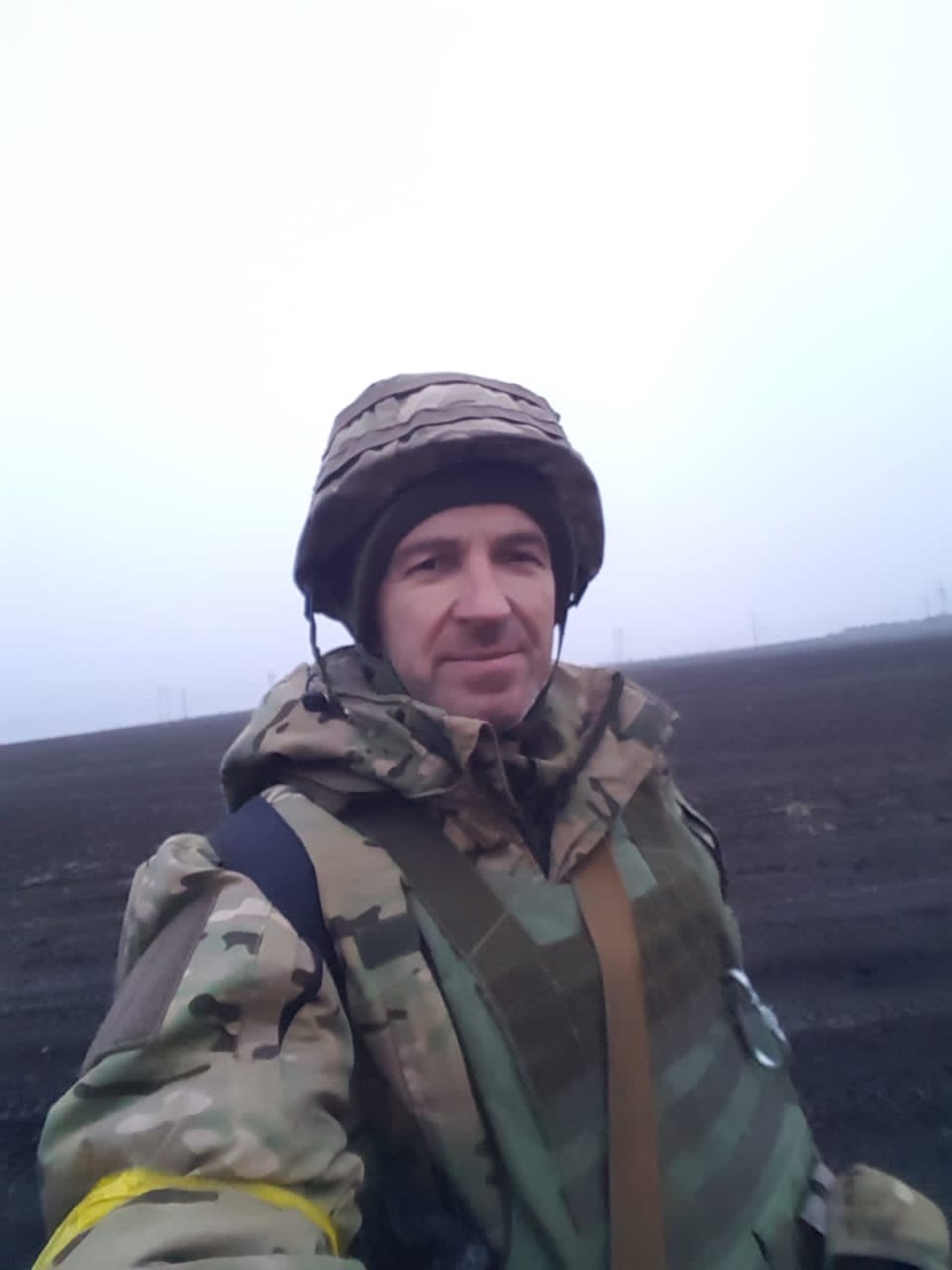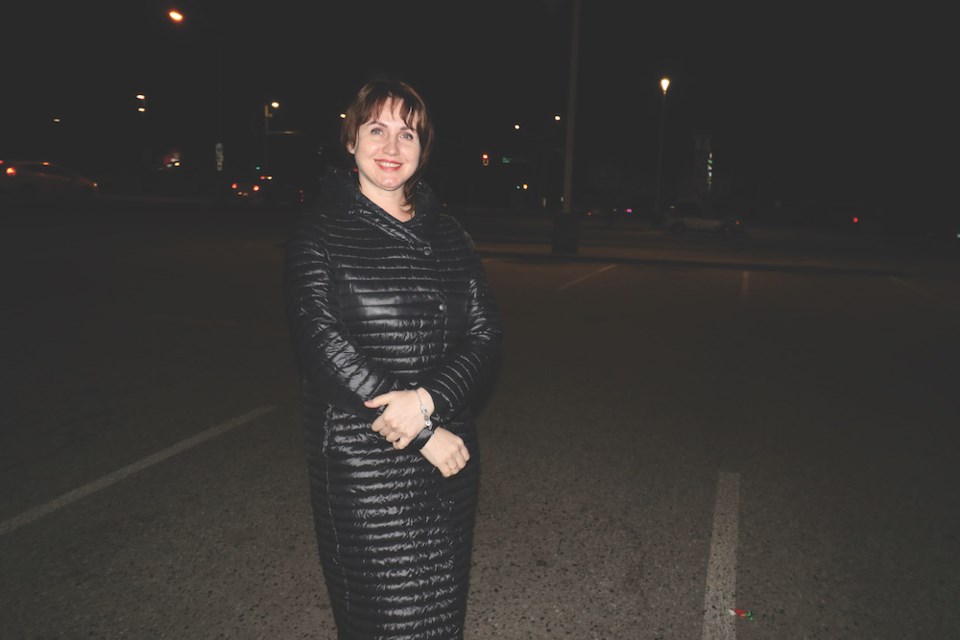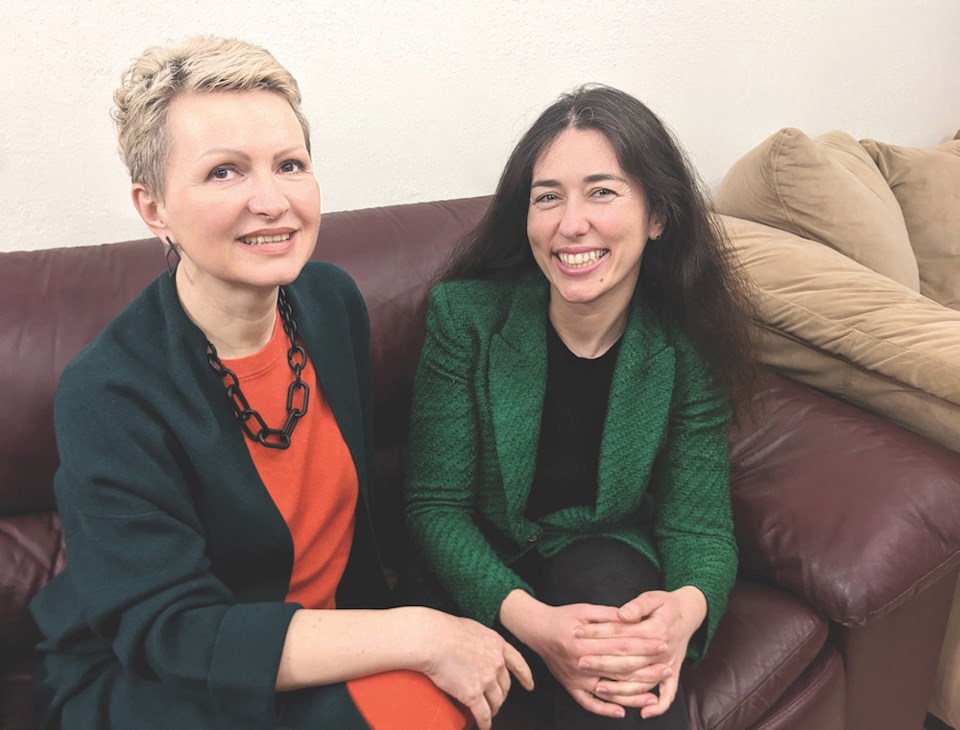In a hillside apartment in Gibsons, Iryna Karmakulova waits every day for a text or a call from her husband.
Viacheslav Karmakulov is stationed in the partially Russian-occupied Zaporizhzhia region of southeastern Ukraine, where Europe’s largest nuclear power plant is under Russian control.
At least a couple of times a month, the text doesn’t come.
Help is here
Seventeen of the Ukrainian families who have moved to the Sunshine Coast since Russia invaded their country, Feb. 24, 2022, are here because of their connections to Daria Anico-Taveras and her family.
Daria and Daniel Anico-Taveras and their five kids immigrated from Ukraine in 2020 and opened the education centre Ideas Space in Upper Gibsons where they started gathering donations after the war started.
Local Judy Rother had been involved in the Tibetan Resettlement Program several years earlier and offered Daria her help. Together with their families, the women gathered money and donations and welcomed 20 families to the Coast – only three of those families have since left the Coast. (Those are just the people brought here through Daria and Judy, more have come over through other routes. According to Canada Border Services Agency, more than 160,000 Ukrainian refugees have arrived in Canada in the past year. More than 11,000 of them have come to B.C.)
“We invited everybody we knew personally to come. We explained to them that it is a safe place and a very nice place,” said Daria.“Many of our really close friends did come.”
Then, their friends told friends who told friends. Everyone who arrived is connected with Daria in one of three ways: they’re her friends, they’re friends of friends or they’re clients of the same immigration consultant the group uses.

Iryna
It’s Valentine’s Day and we’re sitting at the living room table in the apartment Iryna Karmakulova shares with her two sons, Denys and Maksim, in Gibsons. Judy furnished the apartment through donations – from the couches to dressers to the dishes, as she did for the other newcomers. Daria translates as we talk.
Iryna’s family of four spent more than two weeks in their cellar when the war started, as sirens warning of incoming attack rang constantly. They lived in Kharkiv, a strategically important industrial city just 40 kilometres from the Russian border and a hot spot for fighting. When the homes on either side of theirs were shelled, the family realized they had to leave. After packing only essentials, they drove non-stop for three days through traffic jams and attacks to reach Western Ukraine. They made it to the Hungarian border where Iryna and the two boys, 13 and 15 at the time, crossed the border. Viacheslav turned back to enlist.
Iryna and Daria were friends for more than 15 years in Kharkiv, where Daria is also from. After waiting in Lithuania for a few months, their visas came through and the family arrived in June. The boys started school at Elphinstone Secondary School and Iryna was immediately employed as a hairdresser, but had to quit late last year because of her emotional stress.
With Viacheslav fighting and the war ongoing, a feeling of security is elusive.
Every day depends on the call. “If the call doesn’t come for a while, that day is just spoiled. She cannot do anything else,” translates Daria.
Late last year, Iryna went seven days without receiving a text from her husband as he was fighting around the city of Soledar in the Donbas region.
“She fell out of reality. For the seven days, she felt like she was daydreaming,” says Daria. “And she was not able to do anything, to function properly.”
In Ukraine, Iryna was busy – Daria describes her as a super-host. “She had short-term plans, middle-term plans, long-term plans,” says Daria. “And now she’s not planning at all.
“Any plan could be destroyed in a minute.”

Uliana
We meet Uliana Anniuk in the Gibsons IGA parking lot after her shift at the grocery store. We’re in my sedan, Iryna and I in the front seats, Daria translating from the back.
Gibsons looks like her home in Western Ukraine, Uliana says: tall mountains, rivers, similar trees. In Ukraine, she was a civil lawyer and mediator. “Here, she’s a single parent who provides for the family and she has three jobs,” says Anico-Taveras. She’s also training as a financial assistant thanks to generous employers.
Uliana and her son Pavlo, 14, arrived in September after having spent months in Italy with Uliana’s sister. They left their home two days into the war, leaving behind Uliana’s husband who wasn’t allowed to cross the border. “They didn’t know if they would see their house again. Who of their relatives and family would survive the war. Also they left behind their dog,” Daria translates. But Uliana’s responsibility toward her child was paramount. “That’s why she had no doubts.”
It was Pavlo’s best friend who brought the family to Canada. Through the immigration consultant, the friend’s family had discovered the program to come to Gibsons. “Uliana knew that there was an initiative here. And Judy and myself promised to help her with accommodation for the initial period,” Daria says. “It was so important. She was very worried about where they would live.”
For five months, the two lived with a host family with whom she became close. Uliana and Pavlo are in intermediate housing now and will soon move into a longer-term place. Uliana’s husband, who has his Canadian visa, will hopefully join them once he can leave the country.
Uliana calls the Ukrainians who have come to the Coast a “Ukrainian family,” translates Daria. For Christmas, more than 30 of them gathered for a game of Secret Santa. “It was her first experience of playing Secret Santa in her life. And she loved it.”
Settling in
The funds Daria and Judy raised were able to pay or help pay for tickets to Canada for the first 10 Ukrainian families and pay for the first three months of accommodation if they didn’t have a host family. Beyond the financial, each family required help such as transportation, bank and medical appointments. Judy managed the community connections and donations. Judy’s husband, Errol, is an accountant, so he manages the financial side.
Everyone who has been here more than a month has found a job, said Daria.
The one condition Daria and Judy had for the families they helped was once they were settled, they had to help new families coming to the Coast. “And everybody accepted that condition. And everybody honoured that condition,” said Daria.
“Everyone is badly affected by the war. There is no story that is not a tragedy. Each person is going through something really difficult.”
This project has taken over Daria’s life and has kept her busy, which she says is good as “any distraction helps you just get through a day.”
“The downside side of that is that sometimes you really want time for yourself when you are grieving but you don’t have it.
“But that is so balanced by the fact that you are doing something good for your country.”
For the future
Now, Daria is turning some of her attention to fellow Coaster Milos Pospisil’s project of bringing life-saving medical supplies and donations to Ukraine. Pospisil is planning his third relief effort trip for the spring.
For both Uliana and Iryna, it was their sons’ safety and education that drove them to come to Canada, where they were met with generosity. But, the challenges here are many.
Iryna notes that the gap between middle and upper classes in Canada is greater. “Stuff that is considered advanced here was very affordable for middle class [in Ukraine],” translates Daria.
The ever-positive Uliana has words for those considering coming to Canada. “First of all, and most of all, they need to remember that although the help will be there, a lot depends on them. They need to be ready to work hard, to be positive, to stay positive and of course, of course, to help other people. Never stop helping other people.” Uliana thanks everyone for the help she continues to receive every single day.
Asked if she thinks she’ll go back to Ukraine, Iryna says that her only target is to see the end of the war. “No plans are made unless the war is over,” Daria translates. Daria says she agrees wholeheartedly.
“My entire life has just one culmination point, one desire, one thought – like no matter what I’m doing, it’s at the background all the time.”
“And everything you plan, you tie it to the war’s end.”
Judy and Daria are always looking for temporary accommodations, long-term rentals and financial support for resettlement costs for Ukrainians. To offer help or for information, email [email protected].






